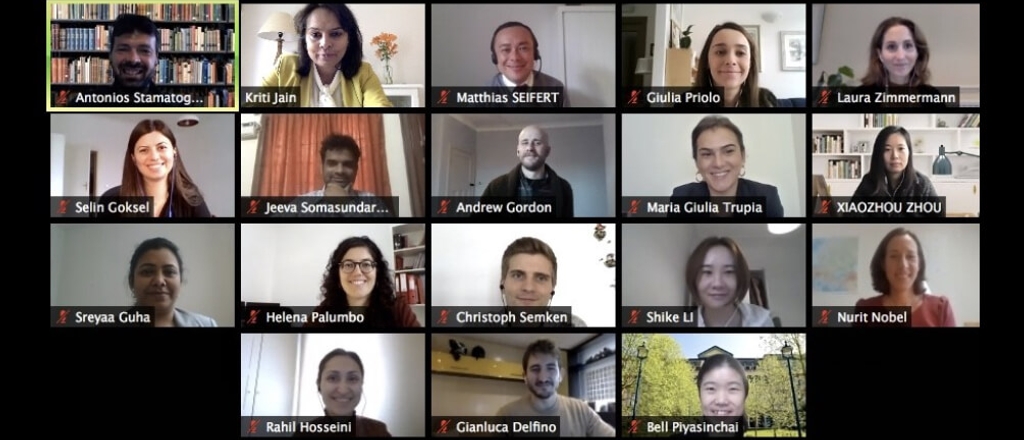- Home
- News And Events
- What’s Going On
- Scholars Discuss Behavioral Decision Making At First Rud Doctoral Consortium
Scholars Discuss Behavioral Decision Making at First RUD Doctoral Consortium

Some 50 scholars from top global business schools presented their latest research on topics of behavioral decision making at the first doctoral consortium hosted by IE’s interdisciplinary research group Risk, Uncertainty and Decisions (RUD). Organizers said they designed the event to prime doctoral candidates to become the future of thought leadership and facilitate networking among researchers. An overwhelming response in submissions pushed the four IE Business School professors organizing the event to extend the schedule to a full day.
Presentations ranged from “Exploiting Seams and Minding Gaps: Strategic Revealing in Clinical Trials By Firms Facing Mandatory Disclosures” and “Decision Making Under Impending Regime Shifts” to “Give a Man a Fish, but Not Money: How In-Kind Donations Increase Contribution Confidence and Donation Likelihood,” “Thank me! Seeking gratitude leads to interpersonal avoidance” and “The Degree of Operating Leverage As the Reciprocal of the Margin of Safety: An Analysis On Operating Risk.”
IE Business School Professor Kriti Jain, Steering Committee member of Risk, Uncertainty, & Decisions Group, explains the significance of what this new enterprise means for thought leadership at IE University:
What was your role specifically in this?
The idea of a virtual conference for doctoral students came up in July this year. The RUD research group at IE meets once a month to discuss the latest research we are developing. I am part of the Steering Committee of the group. In one of our meetings we realized that the pandemic is going to be around for quite some time. Many conferences and research seminars through which doctoral students get crucial feedback on their research had been cancelled. That’s when we decided to organize a half-day virtual event. We put together an organizing committee-- Professors Matthias Seifert, Jeeva Somasundaram, Antonios Stamatogiannakis, and myself-- and released a call for submissions. We got so much interest that we decided to convert this to a full-day event.
What is the biggest advantage this gives students?
Doctoral students are the rising stars who will be influencing scholarship and thought leadership in the next years. Such events give these scholars the ability to present and get feedback on their research. The faculty panelists for the event -- Professors Jose Lejarraga, Laura Zimmermann, Dilney Gonçalves, David Santos, Eda Sayin-- were very generous with their time and effort to help with this.
Apart from our own doctoral scholars, we had very active participation from scholars from business schools such as LBS, INSEAD, IESE, UCL, among others. Such events allow building their network that fuels life-long collaborations and friendships. In the end, we also provided two best student paper awards: first prize to Dmitrii Pugachev & Dmitry Chebotarev from INSEAD for their paper “Pricing Information: Experimental Evidence” and second prize to Selin Goksel from London Business School for her paper “Communication Preferences for Medical Advice Seeking”.
Keeping the event virtual this year allowed us to keep it free of cost for the participants. Participants didn’t have to pay any registration fee, no travel and accommodation was involved.
Professor Gael Le Mens from University of Pompeu Fabra was our keynote speaker who gave valuable tips to the students on navigating the academic career, especially in these uncertain times of the pandemic.
What does this experience add to IE’s community?
RUD is an interdisciplinary group and this event showcases IE’s strength in creating and disseminating cutting-edge knowledge on topics risk, uncertainty, and decision making. Prof. Marco Giarratana, Vice Dean of Research at IE University, mentioned in his opening speech that such events help IE connect with the rising scholars with each other and with IE.
Many scholars of this group have already received prestigious research grants from the European Union, Spanish governments, and corporate institutions. This event will help strengthen IE’s research capabilities, generate additional confidence with our various stakeholders, and build partnerships for future research.
We’d like to thank the Research Office (especially Annet Guevara) and our two doctoral scholars --Shike Li & Zoe Zhou-- for their support with the logistics of the event.